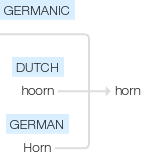Horn
Old English, of Germanic origin; related to Dutch hoorn and German Horn, from an Indo-European root shared by Latin cornu and Greek keras .
wiktionary
From Middle English horn, horne, from Old English horn, from Proto-West Germanic *horn, from Proto-Germanic *hurną. Compare West Frisian hoarn, Dutch hoorn, Low German Hoorn, horn, German Horn, Danish and Swedish horn, Gothic 𐌷𐌰𐌿𐍂𐌽( haurn).
Ultimately from Proto-Indo-European*ḱr̥h₂-nó-m, from *ḱerh₂-(“head, horn”). Compare Breton kern(“horn”), Latin cornū, Ancient Greek κέρας(kéras), Proto-Slavic *sьrna, Old Church Slavonic сьрна(sĭrna, “roedeer”), Hittite[script needed](surna, “horn”), Persian سور (sur), Sanskrit शृङ्ग(śṛṅga, “horn”).
etymonline
horn (n.)
Old English horn "horn of an animal; projection, pinnacle," also "wind instrument" (originally one made from animal horns), from Proto-Germanic *hurni- (source also of German Horn, Dutch horen, Old Frisian horn, Gothic haurn), from PIE root *ker- (1) "horn; head."
Late 14c. as "one of the tips of the crescent moon." The name was retained for a class of musical instruments that developed from the hunting horn; the French horn is the true representative of the class. Of dilemmas from 1540s; of automobile warning signals from 1901. Slang meaning "erect penis" is suggested by c. 1600. Jazz slang sense of "trumpet" is by 1921. Meaning "telephone" is by 1945. Figurative senses of Latin cornu included "salient point, chief argument; wing, flank; power, courage, strength." Horn of plenty is from 1580s. To make horns at "hold up the fist with the two exterior fingers extended" as a gesture of insult is from c.1600.
Symbolic of cuckoldry since mid-15c. (the victim was fancied to grow one on his head). The image is widespread in Europe and perhaps as old as ancient Greece. The German linguist Hermann Dunger ('Hörner Aufsetzen' und 'Hahnrei', "Germania" 29, 1884) ascribes it to a custom surviving into 19c., "the old practice of engrafting the spurs of a castrated cock on the root of the excised comb, which caused them to grow like horns" [James Hastings, "Encyclopedia of Religion and Ethics"] but the image could have grown as well from a general gesture of contempt or insult made to wronged husbands, "who have been the subject of popular jest in all ages" [Hastings].
horn (v.)
1690s, "to furnish with horns," from horn (n.). Earlier in figurative sense of "to cuckold" (1540s). Meaning "to push with the horns" (of cattle, buffalo, etc.) is from 1851, American English; phrase horn in "intrude" is by 1880, American English, originally cowboy slang. Related: Horned; horning.
